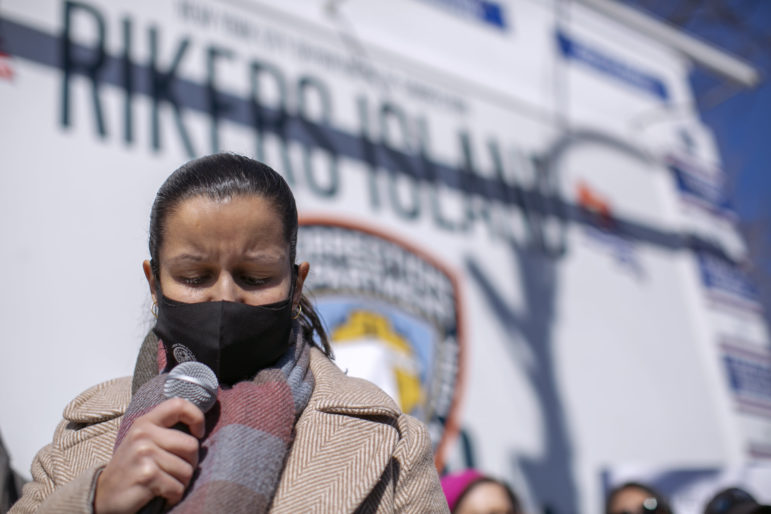In the week before the recent heatwave, Department of Correction officials testified at a hearing that nearly 200 individuals incarcerated at the jail with conditions that are exacerbated by heat were still without air conditioning.

William Alatriste/NYC Council Media Unit
Councilmember Tiffany Cabán at a rally outside Rikers in February. She is one of two lawmakers who visited the jail complex earlier this week.While New York City remained in a steady week-long heat wave, men at a non-air-conditioned intake facility at Rikers Island stripped down to only city-issued shorts and languished in humid conditions for days while waiting to receive a housing assignment.
“There was no ventilation, no A/C, it was oppressively hot,” said Councilmember Tiffany Cabán, who along with Councilmember Sandy Nurse made an unannounced visit to the embattled facility on Monday morning, when temperatures in the city hit 89 degrees following several consecutive days in the mid- to high-90s. Cabán told City Limits that multiple incarcerated individuals she spoke with had been waiting for four days or longer in the intake area, a large rectangular space with cells along the perimeter.
“One of the folks that I spoke to said, ‘Hey, I’m heat sensitive, they know it, it’s on my papers. I have asthma and I’ve been here for four days and haven’t been able to see a doctor,” Cabán told City Limits.
Barring exceptions due to security or safety, the Department of Correction (DOC) says it prioritizes air conditioning for individuals determined to be “heat sensitive”—those with underlying health ailments such as asthma or heart conditions that can make them more susceptible to health problems in high heat.
The lawmakers did not immediately respond to queries about how many people they observed in the intake facility during their visit Monday, though advocates with the Legal Aid Society estimated it would be at least dozens.
And in the week before the heatwave, Patricia Feeney, DOC deputy commissioner of quality assurance and integrity, admitted that nearly 200 individuals incarcerated at the jail with conditions that are exacerbated by heat were still without air conditioning.
More than half of those had refused to be moved to other spaces, Feeney added at a July 12 meeting of the Board of Correction (BOC), which oversees the DOC, the agency that staffs city jails. Nine others were deemed a security risk if moved.
A third—57—of the heat-sensitive individuals without air conditioning did not fit into one of those two categories, Feeney admitted, adding that she did not know at the time where those inmates were currently housed.
The answer to that question still hasn’t been provided two weeks later. “The Board has not yet received any response from DOC about the 57 heat-sensitive individuals,” a BOC spokesperson told City Limits in response to a public records request.
The DOC also did not directly respond to the same question when asked repeatedly by City Limits, instead offering a statement which noted that there have been no reports of heat-related medical emergencies at the jail complex.
“As we do every year, we have implemented a heat plan that carefully considers those deemed most at risk for heat-related concerns, and we are monitoring the situation closely,” said a DOC spokesperson. “We have also installed additional air conditioning to housing units, as well as additional fans.”
In her visit to the facility Monday, Cabán did not see fans in the intake area, she told City Limits.
“We know that detained and incarcerated individuals are impacted more acutely by the climate crisis and other major public health emergencies, due to congregate settings, neglected infrastructure and a general disregard for their lives by authority figures,” said Nurse in a press release following the visit.
Advocates and BOC members have long criticized the DOC heat plan and the agency’s inability to fully follow it. Among its promises are distribution of ice, access to cold showers and use of fans for those incarcerated where air conditioning is not available. But critics say ongoing staffing shortages that have plagued the facility since the pandemic began make access to those services few and far between.
“In previous summers, when the Department has delivered ice, it has consisted of nothing more than a single Dixie cup of ice for each adult, which is plainly inadequate,” wrote the Legal Aid Society in a July 20 letter to the DOC.
The problems are similar to those documented by City Limits last year, when advocates as well as those behind bars said staffing shortages had led to reduced access to showers and even cold water during the hot summer months.
And the year before that, during the summer of 2020, 90 percent of the more than 300 complaints received by the DOC’s Office of Constituent and Grievance Services were related to inoperable air conditioning units or fans, intense heat, lack of access to ice or cool showers and requests by heat-sensitive inmates to move to air-conditioned housing, a BOC report found.
The board has yet to release its heat report for summer 2021.
Robert Quackenbush, attorney with the Prisoner Justice Project for Legal Aid Society, said that so far this summer he has received some complaints—but fewer than he expected—from individuals on Rikers related to heat.
“Some people are saying, ‘I should be [categorized as] heat sensitive, but I’m not, so doctors please reevaluate me.’ Other people are saying, ‘I have been designated as heat sensitive, but I don’t know why I’m not in air conditioning,’” he told City Limits.
“Part of me is glad that I haven’t heard many complaints because maybe the worst fears have not come to pass, but there could be a hundred explanations for why we haven’t gotten as many phone calls about this as I would expect,” he added.
The DOC’s heat plan notes that as of the end of May, just over half of the more than 10,000 people incarcerated at Rikers were in air-conditioned housing. More than 300 who did not have A/C access at that time were considered heat sensitive. The department noted that 84 percent of those individuals refused to be moved.
In the July 12 meeting, BOC member Dr. Robert Cohen questioned if hundreds of beds in Rose M. Singer, the air-conditioned women’s dormitory at Rikers, could be used to supplement the men’s population. DOC Commissioner Louis Molina responded that using the jail as a mixed-gender facility would not allow for “sight and sound separation as required by regulations.”
“I wish when they built these facilities they would have taken air-conditioning into account, but as you know, we have a significantly aging infrastructure that was not kept up with for a number of years and that’s why we find ourselves in this situation,” Molina responded at the time.
Heat is a particular issue in the jail’s enhanced supervision housing (ESH) facilities, which advocates have long demanded the department end the use of, especially during the summer.
Inmates housed in these units—small, solidarity cells that receive little airflow and are not air conditioned—are restricted there for more than 10 hours at a time.
Quackenbush previously told City Limits that the DOC had assured him enhanced supervision housing units would be closed this summer and that inmates would be moved to a facility with air conditioning as part of overall improvements.
But at the close of last month, a federal monitor recommended against the change, citing safety issues, which prompted Mayor Eric Adams to issue an executive order keeping the solitary-confinement units open indefinitely.
“The Board of Correction standards for restrictive housing, which Mayor Adams has suspended by Executive Order, require air-conditioning precisely because being enclosed in one’s cell for long periods creates an extraordinary heat risk,” another letter penned by the Legal Aid Society on July 19 reads.
Quackenbush said he and his team were shocked by the last-minute cancellation of the changes, which would have eliminated heat issues in cells with no ventilation as well as make sweeping improvements to the jail’s use of solitary confinement.
“The monitor focused on this new system of restricted housing that was going to replace the ESH—and basically said DOC is not up to this, they are not trained for this and they will not be able to carry this program out right now,” he said.
“I don’t think anyone’s really optimistic that this change is going to happen this summer.”









